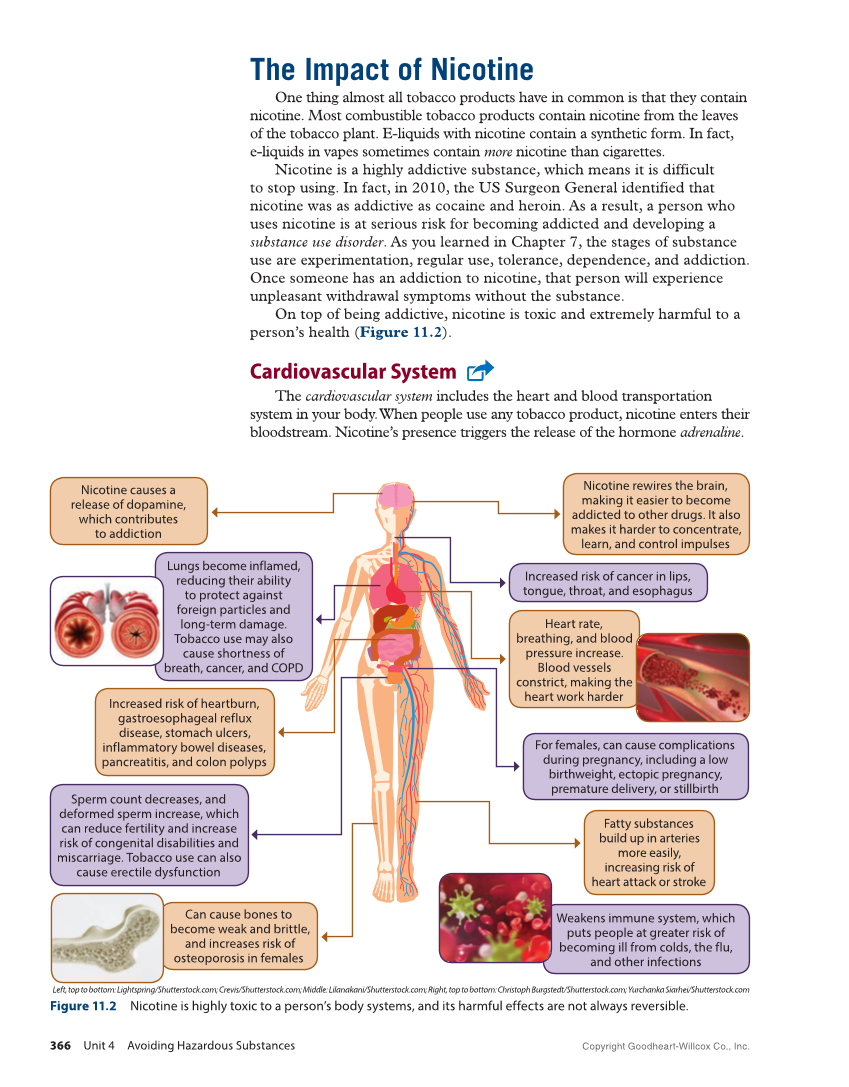The Impact of Nicotine One thing almost all tobacco products have in common is that they contain nicotine. Most combustible tobacco products contain nicotine from the leaves of the tobacco plant. E-liquids with nicotine contain a synthetic form. In fact, e-liquids in vapes sometimes contain more nicotine than cigarettes. Nicotine is a highly addictive substance, which means it is difficult to stop using. In fact, in 2010, the US Surgeon General identified that nicotine was as addictive as cocaine and heroin. As a result, a person who uses nicotine is at serious risk for becoming addicted and developing a substance use disorder. As you learned in Chapter 7, the stages of substance use are experimentation, regular use, tolerance, dependence, and addiction. Once someone has an addiction to nicotine, that person will experience unpleasant withdrawal symptoms without the substance. On top of being addictive, nicotine is toxic and extremely harmful to a person’s health (Figure 11.2). Cardiovascular System The cardiovascular system includes the heart and blood transportation system in your body. When people use any tobacco product, nicotine enters their bloodstream. Nicotine’s presence triggers the release of the hormone adrenaline. Lungs become inflamed, reducing their ability to protect against foreign particles and long-term damage. Tobacco use may also cause shortness of breath, cancer, and COPD Nicotine causes a release of dopamine, which contributes to addiction Increased risk of heartburn, gastroesophageal reflux disease, stomach ulcers, inflammatory bowel diseases, pancreatitis, and colon polyps Sperm count decreases, and deformed sperm increase, which can reduce fertility and increase risk of congenital disabilities and miscarriage. Tobacco use can also cause erectile dysfunction Can cause bones to become weak and brittle, and increases risk of osteoporosis in females Nicotine rewires the brain, making it easier to become addicted to other drugs. It also makes it harder to concentrate, learn, and control impulses Increased risk of cancer in lips, tongue, throat, and esophagus Heart rate, breathing, and blood pressure increase. Blood vessels constrict, making the heart work harder For females, can cause complications during pregnancy, including a low birthweight, ectopic pregnancy, premature delivery, or stillbirth Fatty substances build up in arteries more easily, increasing risk of heart attack or stroke Weakens immune system, which puts people at greater risk of becoming ill from colds, the flu, and other infections Left, top to bottom: Lightspring/Shutterstock.com Crevis/Shutterstock.com Middle: Lilanakani/Shutterstock.com Right, top to bottom: Christoph Burgstedt/Shutterstock.com Yurchanka Siarhei/Shutterstock.com Figure 11.2 Nicotine is highly toxic to a person’s body systems, and its harmful effects are not always reversible. Copyright Goodheart-Willcox Co., Inc. 366 Unit 4 Avoiding Hazardous Substances
